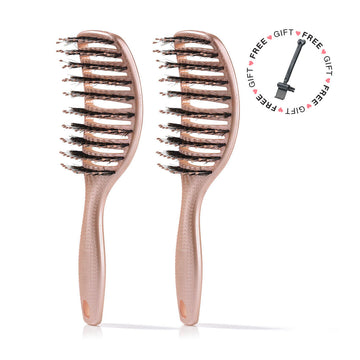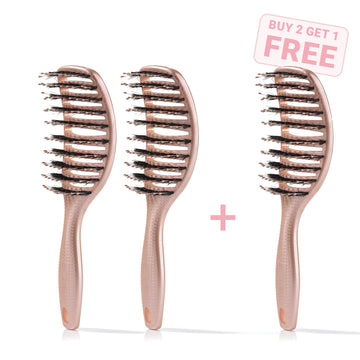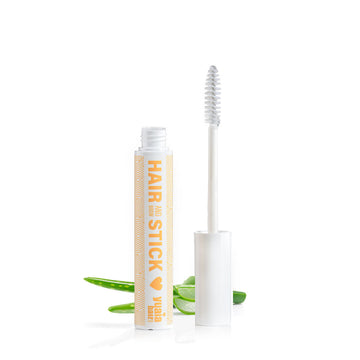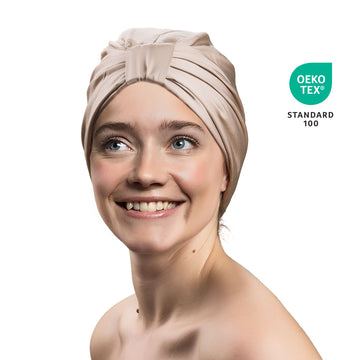What are the most common causes of hair loss in women?
In order to get the most effective treatment against hair loss, it is important to know the cause. You can easily spend a lot of money on different treatment methods, which do not turn out to work, because the cause of the hair loss was something else entirely. The truth behind hair loss is often that it is a complex process that may include genetic, hormonal and environmental mechanisms that trigger hair loss. There are countless reasons for hair loss and hair loss in women in particular is often very different from person to person. It is therefore very important to map out the cause before starting a treatment.
Hereditary hair loss in women
Normally, women's hair thins with age, and around 50% of women find that by the age of 50 their hair has become too thin. However, there is a group for whom hair loss starts very early. These are the ones that can often be hereditary forms of hair loss.
In that group, hair loss already starts when they are in their 20s. Over the next 10 to 20 years, they will gradually lose more and more hair from primarily the top of the head and the back of the head. The most common is that the hair loss is on the neck and top of the head, while there is normal hair growth on the sides of the head.
If you suffer from hereditary hair loss, you will never be completely bald like a man. You will never be able to prevent hair loss if you are genetically predisposed. However, if you eat healthy and take hair vitamins, you can ensure that your hair has the vitamins and minerals it needs. If you generally live a healthy life, it can reduce the problem.
When you lose your hair due to illness, you will typically grow it back after a period of time. However, some diseases, for example skin diseases and fungal diseases of the scalp, will typically require treatment. Therefore, it is important that you make sure to go to the doctor if you suspect that your hair loss is due to illness.
Hair loss when stopping birth control pills
Many women use the contraceptive pill, which is a hormonal contraceptive for women that prevents pregnancy. When women choose to stop taking birth control pills, a hormonal imbalance can occur in the body, as the birth control pill no longer supplies the hormones that the body is used to. In some women this can result in hair loss, but fortunately this type of hair loss is rarely long-lasting. When the body has regained its natural hormonal balance, the hair will once again have a normalized growth cycle and you should not experience abnormal hair loss.
Hair loss due to mental stress
We have gradually heard many people who have experienced hair loss due to mental stress, whether it has been a demanding job or exams.
In line with our increasingly hectic lifestyles, stress has become a bigger and bigger part of many people's everyday lives. Therefore, side effects of stress are seen more and more often here, among other things, hair loss due to stress has also become a bigger factor in relation to hair loss in women. Stress enters and affects the hormonal balance, precisely the production of the male sex hormone, testosterone. Stress causes the body to produce more testosterone, with some of this being converted into a hormone called dihydrotestosterone or DHT. This is a hormone that affects, among other things, men's testicles, adrenal glands and hair follicles in both men and women. This hormone has a powerful effect and can ultimately result in hair loss.
What DHT does is that it prevents proteins, vitamins and minerals from delivering the necessary nutrition to your hair follicles, thereby limiting the hair strands' ability to produce hair. This will mean that the hair will grow more slowly, at the same time the life cycle of the hair will be shortened, and your hair will therefore go into the rejection phase, where it falls out, more quickly.
Stress is therefore no joke and must be taken very seriously. It can be the background behind a lot of other side effects as well. Therefore, it is always a good idea to contact your own doctor if you feel stressed or have some of the symptoms that indicate stress. By taking it in the bud, you can minimize the damage as much as possible. As for the hair under stress, we come further down in the blog post with a lot of good advice for the best possible hair care, should you be affected.
 2-4 day UK delivery
2-4 day UK delivery
 25.000+ satisfied customers
25.000+ satisfied customers
 Satisfaction Guarantee
Satisfaction Guarantee



























